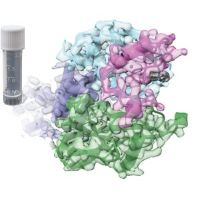Specification
| Description | Recombinant protein from the full-length sequence of Homo sapiens baculoviral IAP repeat containing 7 (BIRC7), transcript variant 1 (NM_139317). |
| Organism | Homo sapiens (Human) |
| Expression Host | Human Cells |
| Tag Info | His or DYKDDDDK. Please contact us if you need further information or require specific designed tag. |
| Purity | Greater than 90% by SDS-PAGE gel |
| Uniprot ID | Q96CA5 |
| Entry Name | BIRC7_HUMAN |
| Gene Names | BIRC7 KIAP LIVIN MLIAP RNF50 UNQ5800/PRO19607/PRO21344 |
| Alternative Gene Names | KIAP LIVIN MLIAP RNF50 |
| Alternative Protein Names | Baculoviral IAP repeat-containing protein 7 (EC 2.3.2.27) (Kidney inhibitor of apoptosis protein) (KIAP) (Livin) (Melanoma inhibitor of apoptosis protein) (ML-IAP) (RING finger protein 50) (RING-type E3 ubiquitin transferase BIRC7) [Cleaved into: Baculoviral IAP repeat-containing protein 7 30kDa subunit (Truncated livin) (p30-Livin) (tLivin)] |
| Application | Antigens, Western, ELISA and other in vitro binding or in vivo functional assays, and protein-protein interaction studies; For research & development use only! |
| Buffer | Purified protein formulated in a sterile solution of PBS buffer, pH7.2, without any preservatives |
| Endotoxin | Endotoxin level is < 0.1 ng/µg of protein (<1EU /µg) |
| Length | 298 |
| Molecular Weight(Da) | 32798 |
| Protein Sequence | (The sequence of expressed protein may have some variation from the sequence shown below. Please contact us for the exact sequence.) MGPKDSAKCLHRGPQPSHWAAGDGPTQERCGPRSLGSPVLGLDTCRAWDHVDGQILGQLRPLTEEEEEEGAGATLSRGPAFPGMGSEELRLASFYDWPLTAEVPPELLAAAGFFHTGHQDKVRCFFCYGGLQSWKRGDDPWTEHAKWFPSCQFLLRSKGRDFVHSVQETHSQLLGSWDPWEEPEDAAPVAPSVPASGYPELPTPRREVQSESAQEPGGVSPAEAQRAWWVLEPPGARDVEAQLRRLQEERTCKVCLDRAVSIVFVPCGHLVCAECAPGLQLCPICRAPVRSRVRTFLS |
Background
| Function | FUNCTION: Apoptotic regulator capable of exerting proapoptotic and anti-apoptotic activities and plays crucial roles in apoptosis, cell proliferation, and cell cycle control. Its anti-apoptotic activity is mediated through the inhibition of CASP3, CASP7 and CASP9, as well as by its E3 ubiquitin-protein ligase activity. As it is a weak caspase inhibitor, its anti-apoptotic activity is thought to be due to its ability to ubiquitinate DIABLO/SMAC targeting it for degradation thereby promoting cell survival. May contribute to caspase inhibition, by blocking the ability of DIABLO/SMAC to disrupt XIAP/BIRC4-caspase interactions. Protects against apoptosis induced by TNF or by chemical agents such as adriamycin, etoposide or staurosporine. Suppression of apoptosis is mediated by activation of MAPK8/JNK1, and possibly also of MAPK9/JNK2. This activation depends on TAB1 and NR2C2/TAK1. In vitro, inhibits CASP3 and proteolytic activation of pro-CASP9. Isoform 1 blocks staurosporine-induced apoptosis. Isoform 2 blocks etoposide-induced apoptosis. Isoform 2 protects against natural killer (NK) cell killing whereas isoform 1 augments killing. {ECO:0000269|PubMed:11084335, ECO:0000269|PubMed:16729033, ECO:0000269|PubMed:17294084, ECO:0000269|PubMed:18034418}. |
| Pathway | |
| Protein Families | IAP family |
| Tissue Specificity | Isoform 1 and isoform 2 are expressed at very low levels or not detectable in most adult tissues. Detected in adult heart, placenta, lung, lymph node, spleen and ovary, and in several carcinoma cell lines. Isoform 2 is detected in fetal kidney, heart and spleen, and at lower levels in adult brain, skeletal muscle and peripheral blood leukocytes. |
QC Data
| Note | Please contact us for QC Data |
| Product Image (Reference Only) |  |

